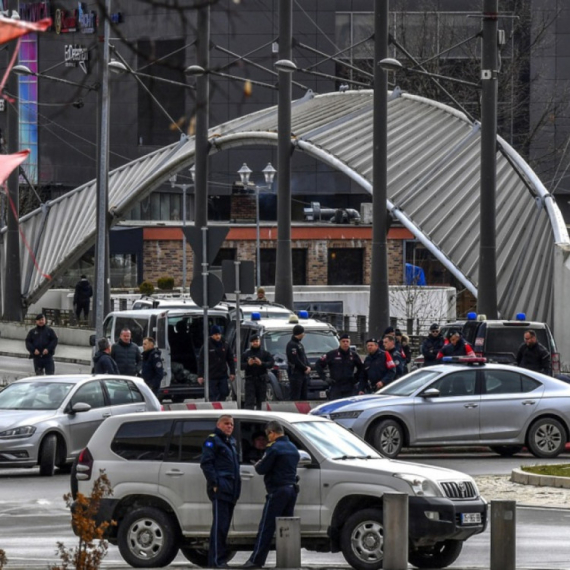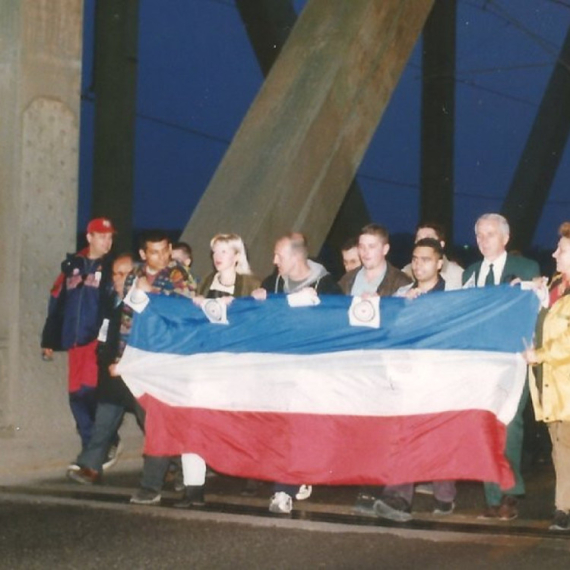Ahtisaari: A burden to pay for
Marti Ahtisaari told Belgrade, in the context of latest developments over Kosovo, that every nation has a burden to pay for
Saturday, 26.08.2006.
11:50

Ahtisaari: A burden to pay for
“The democratic leadership in Serbia today cannot be held accountable for the actions of Slobodan Milošević, but the leaders in Belgrade have to face the heritage and responsibility, because this historical heritage cannot be ignored, but rather must be taken into account in the process of finding a solution for the future status of Kosovo“, Ahtisaari said.The Serbian team for negotiations previously asked Ahtisaari to clarify his statement that Serbs were guilty as a nation and warned that his claim could bring into question his unbiased position in the negotiations. The coordinator of the Serbian delegtion Leon Kojen told a press conference that the team from Belgrade had expressed dissatisfaction and resent towards this statement made by Ahtisaari at the meeting with members of the Serbian delegation on August 8 in Vienna.
There is progress…
At the end of his four-day visit to Priština, where he met with the Kosovo negotiations team, Ahtisaari said that the talks were successful and that there has been progress on issues of decentralisation and the protection of minority rights. He declined to reveal more details and said this would have been unfair towards his interlocutors in the talks, because of a possible influence on the further course of the status negotiations.Ahtisaari pointed out, however, that the gaps between the two parties were narrowing down, adding that a lot has remained to be done in relation to matters of decentralisation, determining the competencies of the new Serb municipalities and the entire set of issues related to the protection of minority rights. Ahtisaari announced his expert team would visit Belgrade very soon and stressed that he expected positive reactions as those received in Priština.
Ahtisaari also said that he still insisted on negotiations over technical issues, which are a prerequisite for dealing with the main question of status. The general impression after Ahtisaari’s press conference is that there has been a certain kind of compromise and agreement between the UN envoy and the Kosovo negotiation team over issues of decentralization, minority rights and the protection of cultural monuments.
According to well-informed sources in Priština, the two delegations have found common ground on all of these issues except for Mitrovica, the ethnically divided town in northern Kosovo that is still waiting for a solution that will be acceptable to all sides in the negotiations.
Reactions
Ranđel Nojkić from the Serbian List for Kosovo Metohija claims it is realistic to assume that Marti Ahtisaari has left Kosovo unsatisfied because he did not succeed in moving the issues of decentralisation and minority rights from deadlock. „My impression is that the Albanians are not prepared to make any concessions, not because of Ahtisaari and the international community, but because of the public opinion and their own people whom they are representing in Kosovo institutions. Quite probably the Albanians, their leaders and the Priština team for negotiations are prepared to accept an imposed solution and this is something I believe is going to happen“, Nojkić says.He added that the problem of Kosovska Mitrovica should have been dealt with earlier. „Kosovska Mitrovica is indeed one of the larger issues, I’m afraid that the other Serb enclaves will follow the example of northern Kosovo and raise certain issues in a more extreme manner in order to box out a situation that will provide them with security and peace”, Nojkić explained. He said the international community had underestimated the gravity of the situation in northern Kosovo and allowed things to go out of hand.
Coordinators of the Belgrade team for negotiations Leon Kojen and Slobodan Samardžić said that UN special envoy Marti Ahtisaari has brought into question the trust he is supposed to enjoy as an international mediator in the Kosovo negotiations and has made the whole process more difficult and precarious. Samardžić and Kojen said that Ahtisaari’s stubborn assignment of historical blame on the Serbian people and state is irreconcilable with the mandate he received from the UN Secretary General and that he is displaying ambitions to act as a jury, which by no means belongs to him.
“As an individual and public official Ahtisaari has the liberty to think whatever he wants, but as the UN Secretary General’s special envoy for Kosovo status negotiations he is obliged to stick to his mandate and the appropriate norms of international conduct”, said the two officials from Belgrade.
The leader of the Serbian List for Kosovo and Metohija Oliver Ivanović said the whole Serbian nation should not pay the price for mistakes that one regime committed in a short period of time. “Although we are all aware of the mistakes that were made by a regime that lasted as long as it had, my opinion is that the entire Serbian nation should not be made to pay such a steep price”. Ivanović said.
Vice President of the Serbian National Council Rada Trajković said that Serbia could not accept an imposed standard of rewarding Albanian leaders in Kosovo who were directly responsible for the persistence of ethnically motivated crimes against Serbs during the past eight years. “I agree with the part of Ahtisaari’s statement where he said that the democratically elected leadership of Serbia cannot be held responsible and that the authorities in Serbia were facing the consequences of Milošević’s rule.
However, if we accept that the former Serbian leadership had done wrong, I don’t see what the Albanian leaders have done to deserve rewards. If Ahtisaari thinks that Serbs in Kosovo are safe and their freedom of movement is not in jeopardy, then we really have nothing to talk about, except to make an observation of the bizarre circumstances in which the safety of the Serbs in Kosovo has been left to people who are responsible and who were direct perpetrators of crimes committed against them”, Rada Trajković said.
The director of the Humanitarian Law Centre Nataša Kandić said she was grateful to Ahtisaari for bringing to the attention of the authorities in Serbia that the policy lead by Slobodan Milošević had to be taken into account when deciding on the final status of Kosovo.
„Ahtisaari’s statement is important because he has made clear to Serbia and its political elites something that they seemingly do not understand, although post-war governments are always aware of this, which is that the government that succeeds a war-time regime have historically inherited the responsibility for the crimes committed by their predecessors in power.
There is no denial or refutation. What has been done is not just the responsibility of Milošević, we are all responsible“, Nataša Kandić said.



























































Komentari 10
Pogledaj komentare